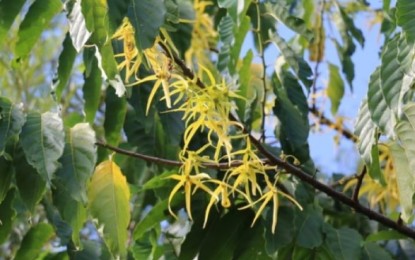
SOURCE OF OIL. An ylang-ylang tree with flowers. The Department of Science and Technology has tied up with the Eastern Visayas State University’s Ormoc City campus to set up a facility to produce essential oil from the ylang-ylang tree. (Photo from Ylang-ylang Network PH page)
ORMOC CITY, Leyte – The Department of Science and Technology (DOST) tied up with the Eastern Visayas State University (EVSU) here to set up a facility that would produce ylang-ylang essential oil.
The DOST turned over PHP900,000 to the EVSU Ormoc campus, financed under the agency’s Community Empowerment Thru Science and Technology (CEST) program.
The project, which will cost PHP1.03 million and will involve counterparts from EVSU and a beneficiary group, will establish a common science and technology training center for ylang-ylang essential oil production with equipment of Good Manufacturing Practices-compliance facility layout.
DOST 8 (Eastern Visayas) regional director Ernesto Granada said the project would directly benefit 58 residents of Esperanza village, a community in the city where the Ylang-ylang tree thrives well.
“This is the first time for DOST to provide intervention for ylang-ylang essential oil production. This will empower target communities using the extraction technology from DOST - Industrial Technology Development Institute,” Granada said during the turnover on Thursday.
EVSU-Ormoc director Gerry de Cadiz, meanwhile, said the establishment of the facility would provide livelihood opportunities for residents and enable the university to improve its research and development.
DOST-Leyte provincial director John Glenn Ocaña said the project is in response to the request of the city government to provide livelihood opportunities for residents where the tree grows.
“Esperanza village has about 6 hectares of land planted with ylang-ylang trees with lots of fallen flowers. We have to house the facility inside a university campus to ensure that this is well-managed and the extraction process is followed,” Ocaña added.
Esperanza village chief Reynaldo Gorres said they sourced about 2,200 planting materials from Bicol in 2015 and about 1,600 of the tree planted in their community survived.
“We are committed to monitor the project to ensure the sustainability of this project. We will plant more so that in the future we can have more cash in our pockets,” Gorres added.
The ylang-ylang tree reaches a maximum height of about 65 feet.
The essential oil can be extracted from ylang-ylang, which finds application in many industries, especially in medicine and perfumery.
The less potent essential oils can be used as medium-to-base notes in perfumes and to make such products as cologne, lotion, food flavoring, and soap.
According to an article published in a medical website, Healthline media, the ylang-ylang has been found in research to boost mood, reduce depression, alleviate anxiety, lower blood pressure, decrease heart rate, stimulate oil production in the skin and on the scalp, repel flying insects, and kill bug larvae. (PNA)
